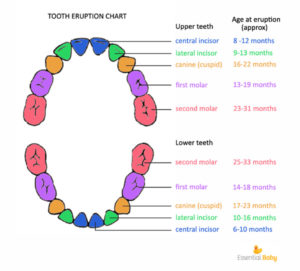Disclaimer :: Fort Worth Moms Blog’s own Emily Y interviewed the dental experts and FWMB partners at Legacy Pediatric and Adolescent Dentistry to answer these questions all mamas have!
This is the second installment of “Teeth Talk.” You can read the first interview here.
We generally do not recommend whitening the primary (baby) teeth. The baby teeth are often whiter in coloring than the permanent teeth anyway, but the enamel is also thinner on the primary teeth and whitening products can cause sensitivity. Most likely we will not recommend whitening until all permanent teeth are present or until orthodontics is complete. Whitening toothpastes are fine for removing some external staining. Crest White Strips are good to use as an initial whitening agent, but success can vary from child to child. There are also professional whitening agents that can only be prescribed at the dental office. We usually see more consistent results using this method. We do recommend using fluoride during all whitening treatments to help reduce sensitivity.
2. If a child has a tooth emergency, how do parents go about handling that?
In the event of a dental emergency, remain calm and evaluate the situation to the best of your ability. Because of the proximity to the head and neck, if there is any loss of consciousness or abnormal responses to questions, we suggest you go to the emergency room for an evaluation. Should your child have one of these traumas listed below (localized to the oral cavity), or you are ready to start them on the road to dental health, we would be happy to answer any questions you have. Just call us at 817-731-6964.
Cut or bitten tongue, lip, or frenum: The frenum is the small fold of skin that restricts movement of the tongue (under it) or inside the lips, connected to the gums. If an injury occurs here, place ice on the area to control swelling. These injuries often will show some swelling and bleeding. To control bleeding, apply pressure with gauze or cloth. Inform your pediatric dentist of the injury. He or she will determine how to proceed from there. Most of these tissue injuries heal within a couple of weeks.
Chipped or fractured teeth: If possible, try to locate the piece of the tooth in case you are instructed to come to the dentist and bring it with you. It is important to check for sharp edges that may require smoothing to prevent injury to the tongue or soft tissue. Contact your pediatric dentist, and he or she will determine when your child should be seen. You can give Children’s Tylenol or Motrin as needed for pain control at the time of the accident. Following the injury, as a parent, it is important to note if the tooth becomes increasingly sensitive or has a color change at some point after the injury. If this occurs, give your pediatric dentist a call. Also, watch for any swelling or boils forming on the gums around the injured tooth. These can occur awhile after the injury but can be symbolic of nerve damage, and an immediate call to your dentist is warranted.
Knocked out baby tooth: In most cases, no treatment is necessary, but contact your pediatric dentist and he or she will determine when your child needs to be seen, and he or she can evaluate and monitor for the permanent tooth to come in.
Knocked out permanent tooth: If possible, find the tooth, and hold it by the crown part of the tooth and not the root. Do not try to clean the tooth with anything! Place the tooth in a cup with milk or your child’s saliva, and contact your pediatric dentist immediately. Time is critical in attempting to save these teeth, so DO NOT DELAY!
Severe blow to the head or jaw: Take your child to the nearest emergency room to assess for head trauma. After an assessment there, your pediatric dentist can be contacted for any teeth or mouth injuries.
For children participating in sports, mouthguards are a great way to prevent trauma to the teeth, lips, and tongue. They fit over the teeth and help avoid broken teeth or movement of the teeth if they are bumped by a ball or another player. The American Academy of Pediatric Dentistry recommends mouthguards for children participating in all contact sports. They also have shown that helmets, mouth guards, and facemasks being used in sports can reduce the frequency and severity of dental injuries. There are a couple of different kinds of mouthguards that can be worn, such as a custom-made one in the dental office that is fit to your child’s mouth, as well as boil-and-bite and stock mouth guards that are similar to a “one size fits all.” It is important to find one that fits well, or else it may not be serving its full purpose, and the child will not want to wear it as it is uncomfortable.
3. Are there any foods or drinks that actually improve oral health in children?
There are some foods that are better for your oral health than others. The following is a short list of good food items:
- Nuts (such as almonds), due to their high calcium and low sugar content.
- Apples, due to their high fiber and water content. The crunchiness of the apple also helps you produce more saliva as a protective mechanism against cavities.
- Carrots are high in fiber and Vitamin A. They are also crunchy, which produces saliva.
- Celery is high in water content and also has Vitamins A and C (antioxidants).
- Leafy greens are high in calcium, vitamins, and minerals.
- Yogurt is high in calcium and protein. If you do choose to eat yogurt, you should pick a plain flavor with no added sugar.
- Cheese is also high in calcium and protein.
- Fluoridated water helps keep the pH neutral in the mouth.
- Milk is high in calcium but should never be taken to bed at night due to natural sugars found in the milk.
Even though these foods are better for promoting not only good overall health, but dental health as well, it is important to remember to brush twice a day (morning and night) and to floss once daily. Oral hygiene is an important aspect of maintaining good oral health, even with a good diet.
4. What is the typical timeframe for tooth eruption? When is a tooth eruption delay a problem?
 I have included a chart of typical eruption times. Usually, the first tooth begins to erupt around six months, but there is a range. There are 20 primary teeth and 32 permanent teeth. The first permanent tooth generally erupts around age six.
I have included a chart of typical eruption times. Usually, the first tooth begins to erupt around six months, but there is a range. There are 20 primary teeth and 32 permanent teeth. The first permanent tooth generally erupts around age six.
There are multiple factors that contribute to the timing of tooth eruption. Generally, delayed eruption is of no significance. If a child erupts his or her teeth late, he or she will generally lose them later as well. There are medical conditions which cause extreme early and late eruption of primary and permanent teeth. Maintaining regular dental visits will allow your child’s pediatric dentist to monitor eruption timing and possibly figure out reasons for eruption timing too far out of the range of normality.
If you have any further questions, please feel free to call our office at 817-731-6964, and we will be happy to discuss them with you.
 Dr. Dan Doss grew up in Kemp, Texas before making the move to Fort Worth to attend TCU. He attended dental school and a two-year residency in the specialty of Pediatric Dentistry at the University of Texas School of Dentistry in Houston. He has been married to Maureen (Mo) for 33 years and has two grown children, Michael and Kaydee and daughter-in-law Megan. He is excited to welcome his first granddaughter in March 2014. He enjoys reading, playing golf and spending time with family and friends.
Dr. Dan Doss grew up in Kemp, Texas before making the move to Fort Worth to attend TCU. He attended dental school and a two-year residency in the specialty of Pediatric Dentistry at the University of Texas School of Dentistry in Houston. He has been married to Maureen (Mo) for 33 years and has two grown children, Michael and Kaydee and daughter-in-law Megan. He is excited to welcome his first granddaughter in March 2014. He enjoys reading, playing golf and spending time with family and friends.
Dr. Liz Gold grew up in Palestine, TX. She attended Texas A&M University where she graduated in 2006 and proceeded to continue her education at the University of Texas School of Dentistry in Houston where she completed both dental school and residency. She has four siblings and three in-laws and has recently become an aunt to Luke (22 months) and Emma (three months). In her free time, she enjoys traveling, running, Aggie football games and spending time with family and friends.
Dr. Doss and Dr. Gold practice at Legacy Pediatric & Adolescent Dentistry in Southwest Fort Worth. They are both Diplomates of the American Board of Pediatric Dentistry and members of the American Academy of Pediatric Dentistry as well as local, state and national dental societies. To read all the post written and sponsored by Legacy, click here.













